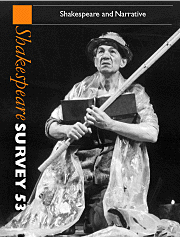Book contents
- Frontmatter
- Shakespeare’s Narremes
- Stepping Out of Narrative Line: A Bit of Word, and Horse, Play in Venus and Adonis
- A ‘consummation devoutly to be wished’: The Erotics of Narration in Venus and Adonis
- Echoes Inhabit a Garden: The Narratives of Romeo and Juliet
- A Midsummer Night’s Dream: Comedy as Apotrope of Myth
- Plutarch, Insurrection, and Dearth in Coriolanus
- Shakespeare, Crossing the Rubicon
- Vernacular Criticism and the Scenes Shakespeare Never Wrote
- The Shadow of Lear’s ‘Houseless’ in Dickens
- Shakespearian Margins in George Eliot’s ‘working-day world’
- In Her Father’s Library: Margaret Fuller and the Making of the American Miranda
- The Magician in Love
- Narrative Approaches to Shakespeare: Active Storytelling in Schools
- Monsters, Magicians, Movies: The Tempest and the Final Frontier
- Shakespeare’s Self-Repetitions and King John
- Inside Othello
- The View of London from the North and the Playhouses in Holywell
- Measured Endings: How Productions from 1720 to 1929 Close Shakespeare’s Open Silences in Measure for Measure
- Shakespearian Utopias
- Shakespeare Performances in England, 1999
- Professional Shakespeare Productions in the British Isles January–December 1998
- The Year's Contributions to Shakespearian Study 1 Critical Studies
- 2 Shakespeare’s Life, Times, and Stage
- 3 Editions and Textual Studies
- Books Received
- Index
The Magician in Love
Published online by Cambridge University Press: 28 March 2007
- Frontmatter
- Shakespeare’s Narremes
- Stepping Out of Narrative Line: A Bit of Word, and Horse, Play in Venus and Adonis
- A ‘consummation devoutly to be wished’: The Erotics of Narration in Venus and Adonis
- Echoes Inhabit a Garden: The Narratives of Romeo and Juliet
- A Midsummer Night’s Dream: Comedy as Apotrope of Myth
- Plutarch, Insurrection, and Dearth in Coriolanus
- Shakespeare, Crossing the Rubicon
- Vernacular Criticism and the Scenes Shakespeare Never Wrote
- The Shadow of Lear’s ‘Houseless’ in Dickens
- Shakespearian Margins in George Eliot’s ‘working-day world’
- In Her Father’s Library: Margaret Fuller and the Making of the American Miranda
- The Magician in Love
- Narrative Approaches to Shakespeare: Active Storytelling in Schools
- Monsters, Magicians, Movies: The Tempest and the Final Frontier
- Shakespeare’s Self-Repetitions and King John
- Inside Othello
- The View of London from the North and the Playhouses in Holywell
- Measured Endings: How Productions from 1720 to 1929 Close Shakespeare’s Open Silences in Measure for Measure
- Shakespearian Utopias
- Shakespeare Performances in England, 1999
- Professional Shakespeare Productions in the British Isles January–December 1998
- The Year's Contributions to Shakespearian Study 1 Critical Studies
- 2 Shakespeare’s Life, Times, and Stage
- 3 Editions and Textual Studies
- Books Received
- Index
Summary
Men (eternal hunters, novelty seekers, insatiable beings), men in their natural lives, pursue the concrete no less than the ideal - qualities not seldom found combined in fairy childhood.
(Concerning the Eccentricities of Cardinal Pirelli, p. 696)Do you love me, master? No?
Mine would, sir, were I human.
(The Tempest 4.1.48; 5.1.20)He got out his Tempest and tried, as a beginning, the sortes. And he went no further.
(The Desire and Pursuit of the Whole, p. 199)INTRODUCTION
This essay is concerned with one small episode in the afterlife, long, rich and often strange, of The Tempest. At different times, to different people, the play has meant very different things: the triumph of harmony and order; the imposition of tyranny; a farewell to art. That last response is an especially persistent one. Legends of autobiography and finality have long invested the play. The beleaguered author, Shakespeare/Prospero, works his magic in splendid isolation, aided only by his own powers of inspiration; the end of the play is the end of the plays. That old interpretation - so well known and so very unfashionable now among critics - is important in the background of this essay; my subject is a sort of development of this, a development into something much less familiar.
The Tempest has been many things to its recipients, but one thing it has hardly ever been is a love story. What critic has shared Prospero's concern for Miranda's sexuality? And yet, earlier in this century, the play did offer one class of reader a parable not only about creativity but about love. Not, however, Miranda's love. For at least two writers, both oncescandalous, the relationship between Prospero and Ariel provided an image of extraordinary suggestiveness and appeal.
- Type
- Chapter
- Information
- Shakespeare SurveyAn Annual Survey of Shakespeare Studies and Production, pp. 137 - 150Publisher: Cambridge University PressPrint publication year: 2000

